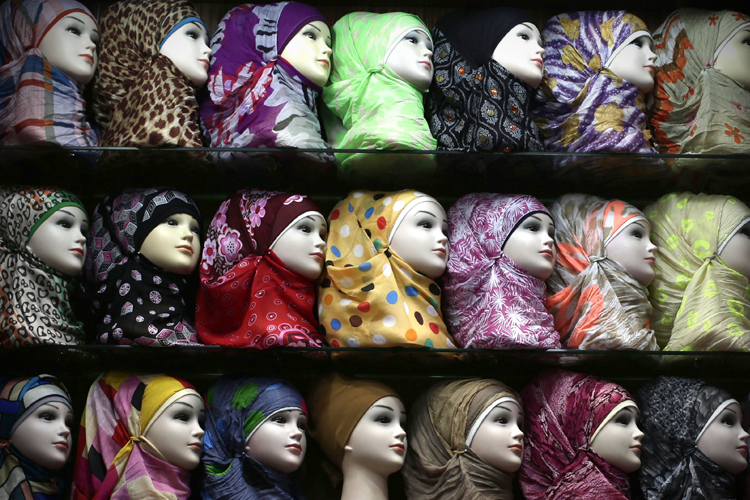As much as I dislike passing generalized judgments, one feature that seems to prevail in Egypt’s social life is meddling in one another’s lives, one time through criticism, the other time through subtle or blatant commentary. Being the free spirit that I am, not only have I come to learn how to shun people’s unsolicited opinions but I have also come to find pleasure in defying society in pursuit of stretching my limits and growing.
However, despite my thickened skin towards societal blabber, I could never escape all sorts of judgments that accompanied both putting on and taking off my hijab (Islamic headscarf). In contrast to what both schools of supporters and opposers may think, neither step actually left a significant impact on the path I walked. With or without the veil, I was – and still am – pretty much the same person.
Drawing The Line Between Peer Pressure and Logic
In September of 2007, I wore the hijab out of complete conviction, backed with a set of unwavering logical arguments. Despite my parents thinking that I was too young and that further on I may find it a burden, I still did what I thought was the right thing to do. It was a step I felt at the time was much needed.
In November of 2015, I took off my hijab with a pretty much similar mindset to when I put it on: complete conviction, unwavering logical argument and a deep belief that I needed to take this step. No doubts, no remorse.
However, what was also common between the two instances of decision making was the subtle peer and societal pressure which played a core part in shaping my beliefs and feelings, even if I was made to believe that they were intrinsic and genuine. It was upon realizing so that it became a necessity to revisit why I wore the hijab at all.
In the years prior to 2007, I saw many girls my age wear the hijab. In parallel, I often heard teachers talk about how big of a responsibility wearing it is and that once you put it on, you can never take it off. Along the same lines, one teacher once told us about the time she decided to take off her veil, which was only followed by a series of unfortunate events. Taking this as a sign from God that she shouldn’t have taken it off, she put it back on.
Filled with fear that every single waking day without wearing my veil only meant more sin, I decided it was high time I wore it. I mean, who in their proper mind would want to fry in hell?
It wasn’t until five years later in 2012 that I started realizing how influenced I was with society’s perception on wearing the veil. Consequently, I started questioning whether I wore the headscarf out of piety or out of following the societal and religious consensus on the path a girl should walk down. Seeing as how I still struggle with the basic practices of Islam, I felt that I portrayed a false image that didn’t exactly reflect my stance.
Opposed by my family at the time, I didn’t take it off. Although I never hated it, I just grew indifferent about it. Hoping to feel natural and at ease in my own skin and in my veil, I started to tweak how I wore it until it eventually looked more like a fashionable rendition of this societal dress code, void of any religious or pious purpose.
This indifference carried on, until I felt like I was doing myself and this religious practice – which I have all the respect for – wrong.
“You know, mom, between myself and God, I don’t consider myself veiled anymore. Let’s be honest, what I wear, the way I wear it, that isn’t real hijab.
“If that’s the case, why do I still wear it? Society? Why should I cover my hair for society? And what’s so obscene in this bulk of hair over my head? I no longer want to play by the rules of this sick society. You and I know very well that putting on or taking off my hair covering won’t attribute to healing or worsening this sickness.”
As though uttering out my thoughts gave them life and gave me purpose, I ventured for a second round of discussions with my family and, this time trusting that I was taking this step based on sound logic and not an impulsive whim, I took it off.
However, in all honesty, I strongly believe that the prevailing trend of women and girls taking off their veil in the past few years had a rather similar impact to the time when I put it on. As certain as I am of the logic which led to me to either step, I will always be a bit doubtful about how much of my logic was purely mine and how much was based on societal influence. Nevertheless, I don’t regret either decision.
Please, Don’t Tell Me I Look Prettier!
Although confident of the step I was taking, what left my heart a bit heavy was worrying I would face harsh judgments. As a matter of fact, almost everyone I met was quite accepting of my decision, sparing me any condescending comments or unwanted religious sermons.
Strangely though, what made me feel rather uncomfortable was the praise I received. Varying between “You look gorgeous!” and “This suits your lifestyle more,” I knew people were trying to show their support, but they were boiling down the value of the journey to mere external looks.
For me, it was a journey of reestablishing my relationship with God, and trying to find Him is what led me to taking off my headscarf – which is only one step among many along the way.
Tired of constructing my spiritual life on the fear of punishment, I vowed to only do things out of love for God and the true desire to do what makes Him happy – similar to how anyone would act towards a person they love. But in doing so, I had to take a step back and reevaluate how I practiced the things which we allegedly do for God. I am not against wearing the headscarf but I am against wearing it for the wrong reasons. Having once bet on God’s punishment when I put it on, I was this time betting on His mercy as I took it off.
Looking back on the doubts, insecurities and beliefs that I dwelled on, it irritated me that to those who tried to show support, it was more or less a matter of looks. With or without the scarf, I have my good days when I’m all shiny and pretty and I have my days when I’m an utter mess. But guess what, that’s how all people are!
I Don’t Regret a Single Day I Wore My Veil
In the years following 2011 and in the wake of this aggressive and mutated face of feminism that has swept the country, many movements and public figures called on women to take off their headscarves, those chains that restricted women and kept them from reaching their full potential.
Looking at myself and my friends who have worn it for many years and who also happen to be very successful and aspiring young ladies, it was quite entertaining how people generalized their personal experiences and traumas, boiling them down to the hijab and how it’s one means of limiting women – kind of sounds like when feminists wanted to burn bras!
But let me tell you what I have achieved during the years when I wore my headscarf. I have graduated both school and college with honors. I started cycling in Cairo at a time when I was called insane for doing so. I traveled to new places in Egypt that I had never seen before and I traveled for the first time on my own to Europe – twice. I took my first steps along the professional career path. I left an impact wherever I worked. I succeeded at some things and failed at others. Fell in and out of love. I grew and the horizons of my capabilities grew farther, always inviting me to go the extra mile. I made new friends, cherished old ones, went through uncountable precious experiences – all of which contributed to my continued growth.
If there is one thing I shall miss about wearing my headscarf, it is proving the absurdity of linking the hijab to limited freedom or aspiration. My eight veiled years were exceptionally rich eight years that I don’t regret a single day of.







Comment (1)
[…] Published on Egyptian Streets […]